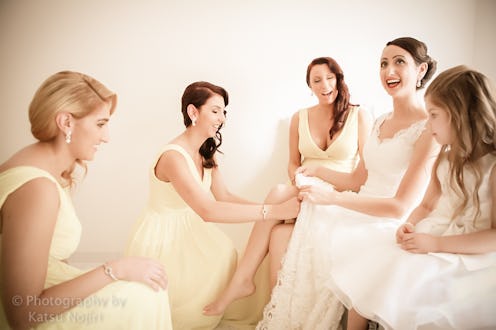
Weddings are often the object of tireless mockery. Those bridezillas! Those needless decorations! People blowing their savings, all for one day! Yet people continue planning elaborate rigamaroles around their weddings year after year. Why? Why do we care so much about weddings? Well, some psychologists suggest there's a psychological need — not just around weddings, but also around graduations, birthdays, funerals, and other celebrations — to put ourselves at ease during transition periods. The key to easing our anxiety around major life events, psychologist Michael Norton told Mic, is establishing rituals that we can tightly control:
When there's a bit of uncertainty in the world... looking for a little bit of order is something humans like to do. It could be by doing a private ritual. It could be by doing a social ritual. Rituals make people feel like they have a handle on things. We know from lots and lots of research that feeling in control is a huge predictor of well-being. People who feel they don't have some control over outcomes in their lives tend to suffer.
By making weddings about bouquets and hors d'oeuvres rather than just families and new chapters, we introduce a more predictable element into marriages. And this predictability gives people comfort, as demonstrated by one study mimicking another unpredictable event: the lottery. A few participants were chosen at random to win $200, and the rest were told either to draw a picture of how they felt, or draw a picture and then put salt on it, tear it up, and count to 10 five times. The people who performed this odd ritual didn't feel as bad about losing the lottery.
If this behavior sounds reminiscent of Obsessive Compulsive Disorder, the roots are in fact similar. People with OCD often practice obsessive hand-washing, food-cutting, and other rituals to feel like they have control over their lives — because if, like Hannah from Girls , you can't make sure your move to Iowa goes as planned, you can at least make sure you remember to say "everyone's path will unwind just right" when you go to the bathroom.
But it's not just bridezillas and people with OCD who are comforted by rituals. In fact, the salt ritual in the study I just mentioned resembles the popular superstition that if you spill salt, throwing some back over your shoulder will prevent bad luck. Sure, we don't all do that, but let's admit it: We've all knocked on wood at least once just in case it really works. The idea that we can prevent a tragedy merely by hitting a table is just too tempting to not at least try.
Weddings and other ritualistic celebrations also allow us to extract as much happiness as possible from positive experiences. Another study showed that people who performed rituals before eating enjoyed the food more, whether there was chocolate or carrots on the menu. Perhaps this effect could explain that "thank you" prayer we had to say before snack time in Girl Scouts.
But while all the commotion around weddings this summer may be understandable, it's also worth mentioning that if the average American couple instead invested the $31,500 it spends on the average wedding, the money would double to about $63,000 within five years. Just think of all the rituals you could stage with that money.
Images: Katsunojiri/Flickr; Giphy (3)